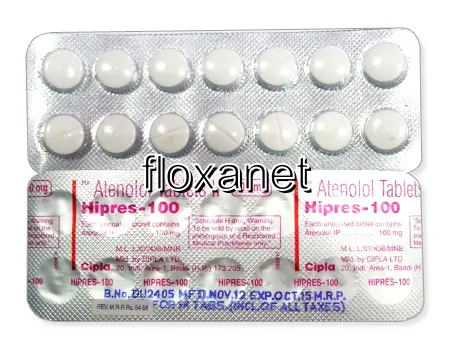| Package | Dosage | Price | Price per Dose | |
|---|---|---|---|---|
| Dosage: 25mg | ||||
| 350 pill | 25mg | £158.43 | £0.45 | |
| 140 pill | 25mg | £72.01 | £0.51 | |
| 84 pill | 25mg | £45.26 | £0.55 | |
| 56 pill | 25mg | £31.88 | £0.57 | |
| 28 pill | 25mg | £18.51 | £0.65 | |
| 14 pill | 25mg | £9.25 | £0.69 | |
| Dosage: 50mg | ||||
| 350 pill | 50mg | £187.23 | £0.53 | |
| 140 pill | 50mg | £79.21 | £0.57 | |
| 98 pill | 50mg | £59.66 | £0.62 | |
| 84 pill | 50mg | £56.57 | £0.67 | |
| 56 pill | 50mg | £36.00 | £0.65 | |
| 28 pill | 50mg | £21.59 | £0.77 | |
| 14 pill | 50mg | £11.31 | £0.82 | |
| Dosage: 100mg | ||||
| 350 pill | 100mg | £184.15 | £0.52 | |
| 140 pill | 100mg | £90.52 | £0.65 | |
| 84 pill | 100mg | £65.83 | £0.78 | |
| 56 pill | 100mg | £47.31 | £0.84 | |
| 28 pill | 100mg | £24.68 | £0.90 | |
| 14 pill | 100mg | £13.36 | £0.93 | |

Atenolol Description
Overview of Atenolol
Atenolol is a widely prescribed medication primarily used to treat cardiovascular conditions such as hypertension (high blood pressure) and angina (chest pain). It belongs to a class of drugs known as beta-blockers. These medications work by blocking the effects of adrenaline on the beta receptors in the heart and blood vessels. By doing so, atenolol helps to slow down the heart rate, reduce the force of heart contractions, and lower blood pressure levels. This results in decreased workload on the heart and improved blood flow, helping to prevent strokes, heart attacks, and other complications associated with high blood pressure.
Effectiveness and Benefits
Many patients find atenolol effective in managing their cardiovascular conditions. Its ability to control heart rate and blood pressure provides significant relief from symptoms like chest pain and palpitations. For individuals with a history of heart attacks, atenolol serves as a preventive measure, reducing the risk of subsequent cardiac events. The medication is also beneficial in managing certain arrhythmias, which are irregular heart rhythms. Its consistent use can contribute to better overall heart health and improved quality of life. However, it’s important to understand that medication should be part of a comprehensive treatment plan that includes lifestyle modifications for optimal results.
Common Dosage and Administration
Atenolol is usually prescribed in tablet form, with typical dosages ranging from 25 mg to 100 mg per day. The exact dosage depends on the patient's condition, response to treatment, and doctor’s recommendations. It is generally taken once or twice daily, with or without food. Patients are advised to follow their healthcare provider’s instructions carefully to avoid under- or over-dosing. Regular monitoring of blood pressure and heart rate is essential to ensure the medication's effectiveness and safety. Patients should not abruptly stop taking atenolol without consulting their doctor, as this can cause a sudden increase in blood pressure or heart problems.
Potential Side Effects
Like all medications, atenolol can cause side effects. Most are mild and tend to diminish over time. Common side effects include tiredness, dizziness, cold hands and feet, and gastrointestinal disturbances such as nausea or diarrhea. Some patients may experience a slower heart rate or low blood pressure, which require medical attention. Less frequently, allergic reactions like rash, itching, or swelling can occur. It is important for users to report any unusual symptoms to their healthcare provider promptly. Individuals with asthma or certain other respiratory conditions should use atenolol cautiously, as beta-blockers can sometimes exacerbate breathing difficulties.
Precautions and Interactions
Before starting atenolol, patients should inform their healthcare provider about their full medical history, especially if they have conditions like asthma, diabetes, or heart conduction issues. Atenolol can mask symptoms of low blood sugar in diabetics, so blood sugar levels need close monitoring. It may also interact with other medications such as other antihypertensives, certain antidepressants, or medications for asthma. Combining atenolol with these drugs could lead to adverse effects like excessive lowering of blood pressure or heart rate. Pregnant and breastfeeding women should discuss the risks and benefits with their doctor before using atenolol. Self-medicating or changing the dose without medical guidance is not recommended.
Conclusion
Atenolol is an effective beta-blocker widely used for managing high blood pressure and related heart conditions. When taken as prescribed and monitored properly, it can significantly improve cardiovascular health and reduce the risk of serious complications. While generally well-tolerated, users need to be aware of potential side effects and drug interactions. As with any medication, ongoing communication with healthcare providers is key to achieving the best outcomes and ensuring safety during treatment.
